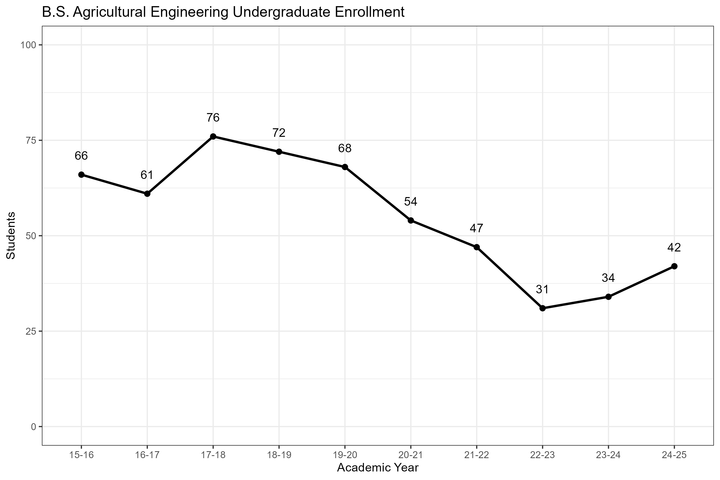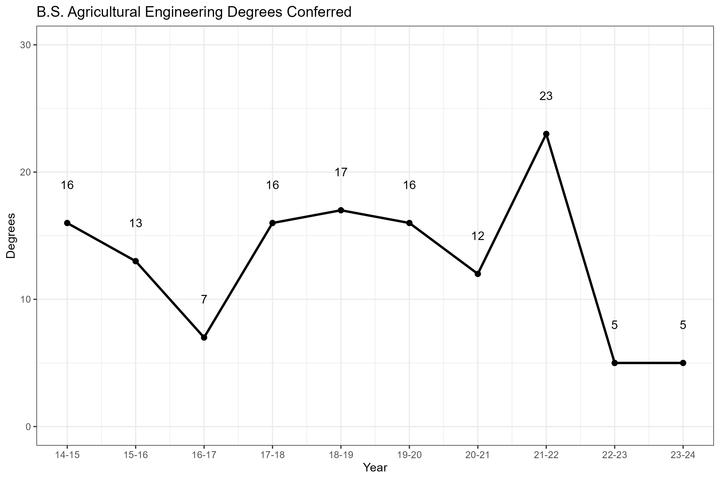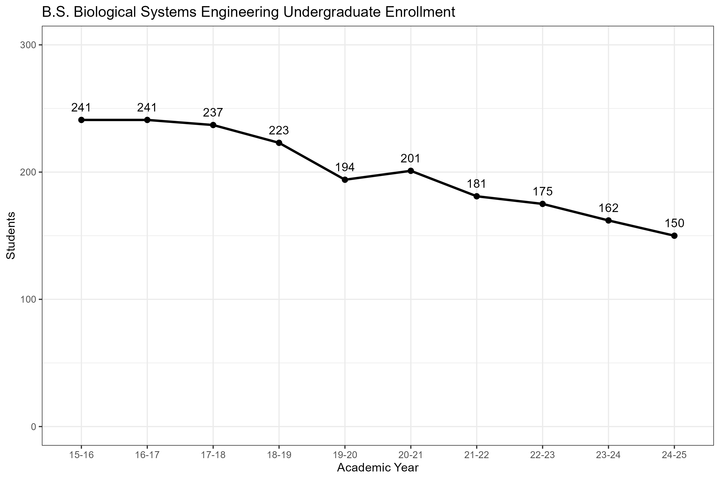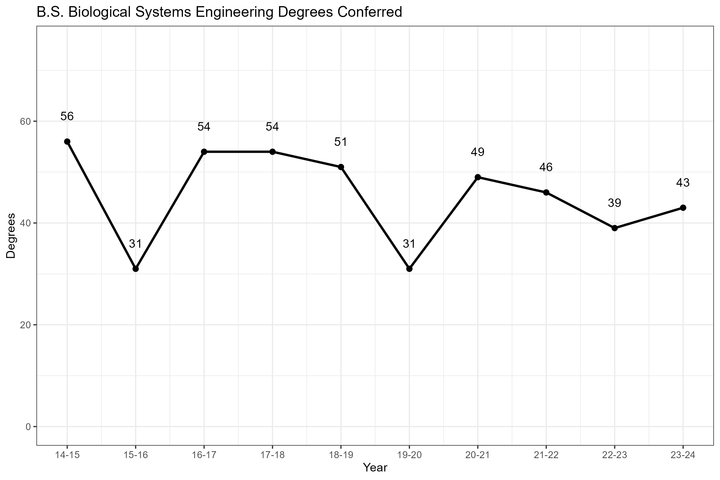ABET Accreditation
ABET Accreditation: Agricultural Engineering
The Agricultural Engineering (BSAE) program is accredited by the Engineering Accreditation Commission of ABET,
http://www.abet.org, under the commission's General Criteria and Program Criteria for Agricultural and Similarly Named
Engineering Programs.
Program Educational Objectives (PEOs)
List of Program Educational Objectives (PEOs)
The Bachelor of Science degree in Agricultural Engineering (AGEN) is accredited by the Engineering Accreditation Commission of ABET. All ABET-accredited programs must publish their Program Objectives for access by employers, parents, students, and others interested in what graduates of the program are expected to be capable of doing once they enter the workforce. The following are the Program Objectives for Agricultural Engineering at the University of Nebraska.
Three to five years after graduation, our graduates will be:
- Confidently using engineering skills in solving problems and providing design solutions in the context of agricultural systems.
- Continuing their professional development, and professional and community service through various opportunities provided by institutions, professional organizations, and other venues in an inclusive manner respecting diversity.
- Responsibly addressing issues of health and safety, ethics, and environmental impacts of engineering decisions in the context of agricultural systems.
Student Outcomes
List of student outcomes
The student outcomes for the Agricultural Engineering program are the following:
- an ability to identify, formulate, and solve complex engineering problems by applying principles of engineering, science, and mathematics
- an ability to apply engineering design to produce solutions that meet specified needs with consideration of public health, safety, and welfare, as well as global, cultural, social, environmental, and economic factors
- an ability to communicate effectively with a range of audiences
- an ability to recognize ethical and professional responsibilities in engineering situations and make informed judgments, which must consider the impact of engineering solutions in global, economic, environmental, and societal contexts
- an ability to function effectively on a team whose members together provide leadership, create a collaborative and inclusive environment, establish goals, plan tasks, and meet objectives
- an ability to develop and conduct appropriate experimentation, analyze and interpret data, and use engineering judgment to draw conclusions
- an ability to acquire and apply new knowledge as needed, using appropriate learning strategies.

Enrollment Data
The table above is a summary subset of 10-year graduation data for the Bachelor of Science in Agricultural Engineering, College of Engineering, University of Nebraska-Lincoln.
Source: College of Engineering, September 2023

Graduation Data
The table above is a summary subset of 10-year graduation data for the Bachelor of Science in Agricultural Engineering, College of Engineering, University of Nebraska-Lincoln.
Source: College of Engineering, September 2023
ABET Accreditation: Biological Systems Engineering
The Biological Systems Engineering (BSBS) program is accredited by the Engineering Accreditation Commission of ABET, http://www.abet.org, under the commission's General Criteria and Program Criteria for Biological and Similarly Named Engineering Programs Program Criteria.
Program Educational Objectives (PEOs)
List of Program Educational Objectives (PEOs)
The Bachelor of Science degree in Biological Systems Engineering (BSEN) is accredited by the Engineering Accreditation Commission of ABET. ABET-accredited programs publish their Program Objectives for access by employers, parents, students, and others interested in what graduates of the program are "expected to be capable of doing once they enter the workforce." The following Program Objectives are for Biological Systems Engineering at the University of Nebraska-Lincoln.
Three to five years after graduation, our graduates will be:
- Confidently using engineering skills in solving problems and providing design solutions in the context of biological systems.
- Continuing their professional development, and professional and community service through various opportunities provided by institutions, professional organizations, and other venues in an inclusive manner respecting diversity.
- Responsibly addressing issues of health and safety, ethics, and environmental impacts of engineering decisions in the context of biological systems.
Student Outcomes
List of student outcomes
The student outcomes for the Agricultural Engineering program are the following:
- an ability to identify, formulate, and solve complex engineering problems by applying principles of engineering, science, and mathematics
- an ability to apply engineering design to produce solutions that meet specified needs with consideration of public health, safety, and welfare, as well as global, cultural, social, environmental, and economic factors
- an ability to communicate effectively with a range of audiences
- an ability to recognize ethical and professional responsibilities in engineering situations and make informed judgments, which must consider the impact of engineering solutions in global, economic, environmental, and societal contexts
- an ability to function effectively on a team whose members together provide leadership, create a collaborative and inclusive environment, establish goals, plan tasks, and meet objectives
- an ability to develop and conduct appropriate experimentation, analyze and interpret data, and use engineering judgment to draw conclusions
- an ability to acquire and apply new knowledge as needed, using appropriate learning strategies.

Enrollment Data
The table below is a summary subset of 10-year graduation data for the Bachelor of Science in Biological Systems Engineering, College of Engineering, University of Nebraska-Lincoln.
Source: College of Engineering, September 2023

Graduation Data
The table below is a summary subset of 10-year graduation data for the Bachelor of Science in Biological Systems Engineering, College of Engineering, University of Nebraska-Lincoln.
Source: College of Engineering, September 2023